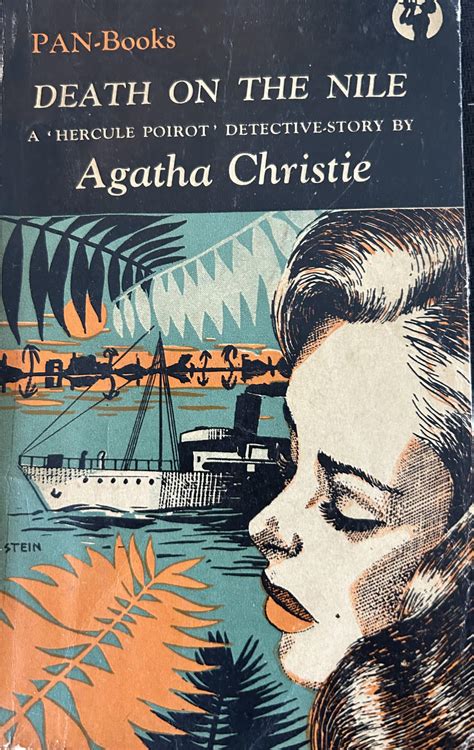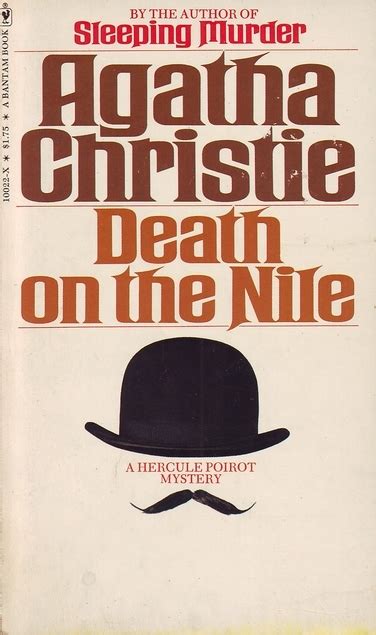Death on the Nile by Agatha Christie

Death on the Nile, written by the renowned mystery novelist Agatha Christie, is a seminal work in the detective fiction genre. First published in 1937, this novel features one of Christie's most beloved characters, the inimitable Hercule Poirot, as he navigates a complex web of intrigue and deception aboard a luxurious steamship sailing along the Nile River. The story is a masterclass in plotting, characterization, and suspense, showcasing Christie's unparalleled skill in crafting a narrative that continues to captivate readers to this day.
The Plot Unfolds

At the heart of Death on the Nile is the murder of Linnet Doyle, a wealthy and beautiful young woman who has recently married Simon Doyle, a man of significantly lower social standing. The couple’s honeymoon is marred by the presence of Simon’s former lover, Jacqueline de Bellefort, who is determined to disrupt their happiness. As the story unfolds, it becomes clear that Linnet’s wealth and position have created a multitude of enemies among her acquaintances, each with a plausible motive for the crime. Hercule Poirot, who happens to be on vacation in Egypt, finds himself drawn into the investigation, utilizing his extraordinary detective skills to unravel the mystery.
Character Analysis
One of the strengths of Death on the Nile is its richly drawn cast of characters, each with their own distinct personality, backstory, and motivations. From the glamorous and selfish Linnet Doyle to the quiet, observant Hercule Poirot, every character plays a crucial role in the unfolding drama. Christie’s characterization is nuanced and insightful, often using the characters’ interactions and dialogue to reveal their true nature and intentions. The novel also explores themes of love, greed, class, and the social conventions of the time, adding depth and complexity to the narrative.
| Character | Motivation |
|---|---|
| Linnet Doyle | Desire for happiness and social status |
| Simon Doyle | Love for Linnet and desire for financial security |
| Jacqueline de Bellefort | Revenge against Simon for jilting her |
| Hercule Poirot | Determination to solve the mystery and see justice served |

Investigation and Resolution

As Poirot delves deeper into the mystery, he encounters a plethora of suspects, each with a convincing alibi and a plausible motive for the crime. Through his characteristic method of observation and deduction, Poirot slowly begins to untangle the complex web of relationships and alliances among the passengers. The novel’s climax is both surprising and satisfying, as Poirot reveals the identity of the murderer and explains the ingenious method by which the crime was committed. Christie’s mastery of plot twists and red herrings keeps the reader guessing until the very end, making Death on the Nile a compelling and engaging read.
Key Points
- Death on the Nile is a classic mystery novel featuring Hercule Poirot as the detective.
- The story takes place on a steamship sailing along the Nile River, where a wealthy young woman is murdered.
- The novel explores themes of love, greed, class, and social conventions of the time.
- Hercule Poirot's character is notable for his attention to detail, understanding of human psychology, and commitment to justice.
- The plot is complex, with multiple suspects and motives, keeping the reader engaged until the surprising revelation at the end.
Historical Context and Literary Significance
Death on the Nile was written during a period of significant social change in the early 20th century. The novel reflects the class divisions and social hierarchies of the time, as well as the growing independence of women. Christie’s work was also influenced by her own experiences traveling in Egypt and her fascination with ancient cultures. Today, Death on the Nile is recognized as one of the greatest mystery novels of all time, its enduring popularity a testament to Christie’s skill as a storyteller and her ability to craft compelling characters and plots.
What is the central plot of Death on the Nile?
+The central plot revolves around the murder of Linnet Doyle, a wealthy young woman, on her honeymoon cruise along the Nile River, and the subsequent investigation by Hercule Poirot to uncover the identity of the killer.
What themes are explored in Death on the Nile?
+The novel explores themes of love, greed, class, and the social conventions of the time, providing a nuanced portrayal of the human condition and the complexities of relationships.
What makes Hercule Poirot such an enduring character?
+Hercule Poirot's enduring appeal can be attributed to his unique blend of intelligence, wit, and humanity, as well as his distinctive appearance and mannerisms, which have become iconic in detective fiction.
In conclusion, Death on the Nile is a masterpiece of mystery writing that continues to captivate audiences with its intricate plot, memorable characters, and historical significance. As a work of detective fiction, it showcases Agatha Christie’s unparalleled skill in crafting a narrative that is both entertaining and thought-provoking, ensuring its place as one of the most beloved and enduring novels of the genre.



